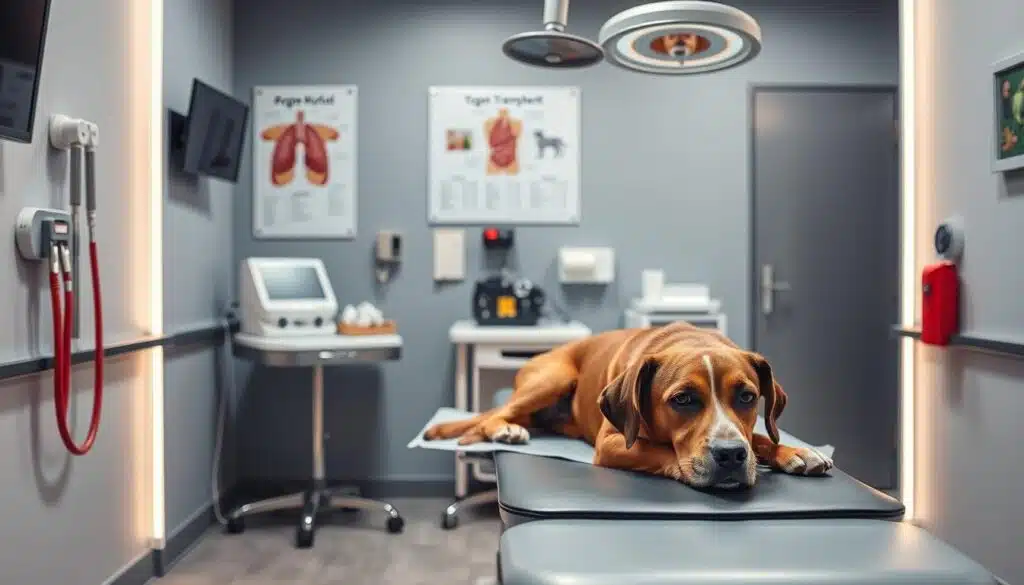As a devoted pet owner, it’s key to know what pet insurance covers for organ transplants. Last year, over 6,900 organ transplants were done. This shows how urgent it is to be ready for such big surgeries.
Organ transplants, like kidney and liver ones, are getting more common in vet care. But, they can cost a lot, from $3,500 to $30,000. This makes getting the right pet insurance very important.
Knowing how to pick the best pet insurance for organ transplants is crucial. By looking at different pet insurance options, I can get the best care for my pet. This keeps my pet healthy and me at peace. This guide will help you to find answer of what pet insurance covers organ transplant?.
Table of Contents
ToggleKey Takeaways
- Organ transplant procedures for pets can be costly, ranging from $3,500 to $30,000.
- Coverage for organ transplants is becoming more common among insurance providers.
- Understanding various types of pet insurance plans is essential for selecting the right one.
- The survival rates for different organ transplants can significantly influence decisions on insurance.
- Some top-rated companies offer exceptional coverage, including Trupanion and Healthy Paws.
Basics of Pet Insurance
Pet insurance is a key financial safety net for unexpected vet bills. I learned that there are many different policies out there. Basic pet insurance covers things like vet visits, tests, treatments, and meds.
Each company offers different levels of protection. This affects how well they cover serious things like organ transplants.
When looking at comprehensive pet insurance with organ transplant, I saw big differences. Some plans offer a lot of benefits, while others have more limits. It’s important to know if a plan covers almost everything, except for what’s listed as not covered.
Learning about pet insurance for organ transplants helped me make a better choice.
Important things to think about include:
- Accidental injury coverage
- Illness coverage
- Additional and optional benefits, such as wellness services
When I looked at pet insurance, I saw common things that aren’t covered. Things like pre-existing conditions and some treatments, like dental care, are often not included. Knowing this helped me pick the best policy for my pet.
| Coverage Type | Included Benefits | Common Exclusions |
|---|---|---|
| Accident Only | Accidental injuries | Illnesses, pre-existing conditions |
| Accident and Illness | Accidents and illnesses | Pre-existing conditions, elective treatments |
| Comprehensive | Accidents, illnesses, wellness services | Certain treatments, dental care, pre-existing conditions |
Importance of Pet Insurance for Unexpected Veterinary Costs
Pet insurance is key for handling sudden vet bills. Emergencies like serious injuries or illnesses can cost thousands. Without insurance, I might have to choose between my pet’s health and my wallet.
Standard vet care for dogs costs over $3,200 a year. Cats cost about $1,715, plus emergency vet visits. Pet insurance helps cover these costs, giving me peace of mind.
Pet insurance offers many benefits, like covering diagnostics and treatments for accidents and illnesses. This protection reduces stress when my pet needs urgent care.
Insurance companies offer different plans to fit your needs. For example, Lemonade’s pet insurance lets me choose any vet in the U.S. This way, I can focus on my pet’s health, not just the cost.
When thinking about pet insurance, remember the unexpected vet costs. With the right plan, I can give my pets the best care without worrying about money.
What Pet Insurance Covers Organ Transplant
Understanding pet insurance for organ transplants is key to pet care. Many policies help with organ transplants. This means pets can get needed care without breaking the bank.
Organ transplants are very expensive. They need special vet care. That’s why insurance is so important.
Types of Organ Transplants Covered
Pet insurance covers many organ transplants. This includes:
- Kidney transplants
- Liver transplants
- Heart transplants
- Pancreas transplants
- Bone marrow transplants
Companies like Trupanion and Fetch Pet Insurance have plans that cover these. This shows how important insurance is for pets.
Limitations and Exclusions in Organ Transplant Coverage
Even with coverage, there are limits and exclusions. Pre-existing conditions are usually not covered. If your pet has a history of organ issues, that won’t be covered.
Some policies have waiting periods for certain transplants. It’s important to read the policy carefully. This way, you know what’s covered and what’s not.
So, does pet insurance cover organ transplants? Yes, but there are rules based on the policy you choose.
| Insurance Provider | Types of Transplants Covered | Pre-existing Condition Clause | Exclusions |
|---|---|---|---|
| Trupanion | Kidney, Liver, Heart | Not covered | Waiting periods for certain conditions |
| Fetch Pet Insurance | Bone Marrow, Pancreas | 6-month waiting for some | Wellness visits not covered |
Types of Pet Insurance Plans
Choosing the right pet insurance plan is key to my pet’s health. There are many plans, each with its own benefits. They cover things like organ transplants, accidents, and wellness needs. Knowing about these plans helps me choose the best for my pet.
Accident-Only Plans
Accident-only plans cover mishaps and emergencies. They help with things like broken bones and snake bites. These plans are cheaper, but they don’t cover illness or organ transplants.
This might be a problem if my pet needs more care later.
Accident and Illness Plans
Accident and illness plans cover both accidents and illnesses. They’re great for serious medical needs, like organ transplants. These plans offer more coverage, giving me peace of mind.
Wellness Plans and Their Role
Wellness plans help keep pets healthy with preventative care. They cover things like vaccinations and dental care. While they’re not for surgeries, they’re vital for overall health.
They help prevent illness and reduce the need for costly surgeries. This lowers stress and financial worries.
Evaluating Coverage Based on Policy Types
Understanding policy types is key when looking at pet insurance. It’s important to think about annual payout limits and wellness options. This is especially true for expensive procedures like organ transplants.
Annual Payout Limits
Every pet insurance plan has a yearly limit on payouts. This limit shows how much you can claim for vet costs in a year. Organ transplants can cost a lot, so it’s crucial to check these limits.
If a policy has a low limit, it might not cover all costs. I aim to match these limits with my pet’s vet needs.
Additional Wellness Options
Many plans offer wellness options like preventive care and early screenings. These options can help catch health issues early. This can save money on future vet bills.
These features are great for keeping my pet healthy. When looking at pet insurance for organ transplants, these options are very valuable.
| Policy Type | Annual Payout Limit | Wellness Options Available |
|---|---|---|
| Basic Plan | $5,000 | No |
| Standard Plan | $10,000 | Yes |
| Premium Plan | No Limit | Yes |
Understanding Pet Medical Expenses for Organ Transplants

Dealing with pet medical expenses for organ transplants can be scary. It’s important to know the costs to make good choices. These procedures can be very expensive, especially without insurance.
Common Organ Transplant Costs
Many things affect the cost range for organ transplants in pets. The type of transplant and care needed are big factors. Here are some typical costs for different transplants:
| Type of Transplant | Initial Surgery Cost | Annual Follow-Up Expenses |
|---|---|---|
| Kidney Transplant (Cat) | $10,000 – $20,000 | $2,000 – $4,000 |
| Kidney Transplant (Dog) | Up to $15,000 | Varies significantly |
| Pancreatic Cell Transplant (Dog) | $3,000 – $5,000 | Annual expenses may apply |
These numbers show how expensive these surgeries are. Transplants also have extra costs like travel and ongoing care. Without insurance, these costs can be very hard to handle.
Financial Burden Without Insurance
Not having insurance makes organ transplants very costly. The total cost, including care after surgery, can be much higher. For example, a kidney transplant for a pet includes surgery, travel, and follow-up care, raising the cost a lot.
Getting judged by family and friends about these expensive choices can be tough. Some pets, like dogs, might face higher risks of rejection. But, the decision often comes down to how much you love your pet and want to care for them.
As vet care gets better, having pet insurance that covers transplants is more important. It can help make these costs easier to handle.
Finding Pet Insurance That Covers Organ Transplant
Looking for pet insurance that covers organ transplants is important. Top companies like Trupanion, Healthy Paws, and Pets Best offer good options. They have different policies for all kinds of care.
Top Pet Insurance Companies with Organ Transplant Coverage
There are many good providers to choose from. Here are some key features to look for:
- Trupanion – Known for great customer service and quick claims.
- Healthy Paws – Fast claim reviews, with some payments in 48 hours.
- Pets Best – Clear policies and quick payments, loved by many.
- Nationwide Pet Insurance – Covers up to 90% and pays fast.
- Spot Pet Insurance – Easy claims and a friendly team.
Comparing Policy Features
It’s key to compare policy features when choosing. Look at these important points:
- Annual limits – How much is covered in a year for transplants.
- Waiting periods – Time before coverage starts, varies by company.
- Specific procedures covered – Each policy lists which transplants are covered.
- Deductibles – Know how deductibles work to understand costs.
Spending time to compare these details helps make a smart choice. It’s about finding the right fit for your pet and budget.
Common Concerns: Pre-existing Conditions and Their Impact

Thinking about pet insurance makes me worry about pre-existing conditions. Many policies don’t cover health issues before the policy starts. This is a big problem for pets with ongoing health issues.
It’s important to know how these exclusions work. If my pet needs an organ transplant, I need to check if the policy covers it. A good policy helps me make smart choices for my pet’s health, especially with big vet bills.
To show the costs of pet surgeries, I made a list of common procedures and their prices:
| Procedure | Cost Range |
|---|---|
| CCL/ACL Surgery | $2,000 – $4,000 |
| Eye Surgery (Enucleation) | $600 – $1,000 |
| Total Hip Replacement | $3,500 – $7,000 per hip |
| Tumor Removal Surgery | $180 – $2,000 |
| Limb Amputation | $700 – $1,000 |
| Intestinal Obstruction Removal | $800 – $3,500 |
| Neutering | Up to $250 |
| Spaying | Up to $500 |
| Joint Surgery | $100 – $3,000 |
These prices show how much surgeries cost. Knowing about exclusions for organ transplants is key. Choosing a policy that covers pre-existing conditions is crucial for my pet’s care without breaking the bank.
How Reimbursement Works for Organ Transplant Procedures
Learning about reimbursement for pet surgery is key to planning for big medical bills. Organ transplants for pets can cost a lot. Knowing how reimbursement works helps manage these costs better.
Understanding Deductibles and Reimbursement Rates
My pet insurance has deductibles and rates I need to get. For example, a $300 deductible and a 90% reimbursement rate mean I get $2,400 back for a $3,000 surgery. This shows how deductibles and rates affect what I pay after surgery.
Pet insurance is crucial for many surgeries. Here are some examples:
- CCL/ACL surgery: Costs $2,000 to $4,000, covered if needed.
- Eye surgery: Costs $600 to $1,000, covered if not pre-existing.
- Hip surgery: Costs $3,500 to $7,000, coverage varies by cause.
- Tumor removal: Costs $180 to $2,000 or more, coverage depends on diagnosis.
Organ transplants are pricey but vital for some pets. Without good insurance, the cost is overwhelming. Insurance offers claims options for these big procedures. Knowing my policy well helps use these benefits best.
Conclusion
Choosing the right pet insurance for organ transplant coverage is key for pet owners. These surgeries can cost thousands to tens of thousands of dollars. Good pet insurance can help a lot with these costs.
It’s important to know what each insurance plan covers. This includes things like medications and care after surgery. By comparing different plans, I can find the best one for my pet’s needs.
Getting the right pet insurance is crucial for my pets’ health. A good plan covers important treatments like organ transplants. This helps me give my pets the best care and makes me feel better too.








